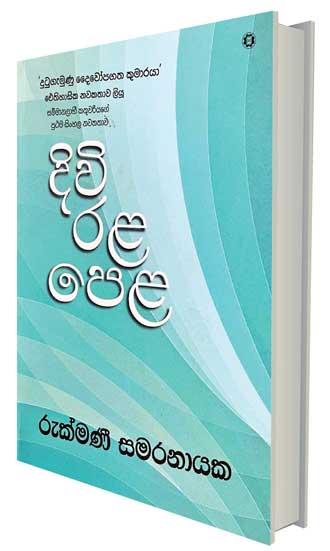Reply To:
Name - Reply Comment

| Standing tall in the novel is the character of Weerawickreme, the patriarch of the affected family who never let his morale fail him in the face of adversity |
Another observation: the vast numbers of educated women postretirement, do not idle at home
The writing of the novel “Divi Rala Pela” makes Rukmani Samaranayake a versatile author
 With the launching of “Divi Rala Pela,” a Sinhala contemporary novel, Rukmani Samaranayake, who has written a moving tale that provides insights into the issue of slum dwellers and their impact on urban life, has emerged as a formidable novelist.
With the launching of “Divi Rala Pela,” a Sinhala contemporary novel, Rukmani Samaranayake, who has written a moving tale that provides insights into the issue of slum dwellers and their impact on urban life, has emerged as a formidable novelist.
 Digging into a thorny issue of the Colombo’s urban proletariat which had caused multiple problems to society, the novelist initially speaks of their poverty. She continues thereafter with their harrowing experiences which result in their improper behaviour and their engagement with varied forms of underworld activities.
Digging into a thorny issue of the Colombo’s urban proletariat which had caused multiple problems to society, the novelist initially speaks of their poverty. She continues thereafter with their harrowing experiences which result in their improper behaviour and their engagement with varied forms of underworld activities.
The novel however, opens its narrative with inroads made by slum dwellers to middle class society leading to the breaking up of the peaceful existence and the psyche of a middleclass family. Related by Subhashini the protagonist, the story revolves around how dynamics of slum dwellers impacted on the lives of the three main characters. Subhashini witnesses the brother becoming a victim of devious tricks of a girl from the slums and of the pain it brought to her family. Yet, she is shattered when she, as a teacher, hears the horrifying stories that take place in their homes from the affected street kids in her class.
Middle class families
Standing tall in the novel is the character of Weerawickreme, the patriarch of the affected family who never let his morale fail him in the face of adversity. The novelist who also exposes the violations that take place in the so-called middle class families speaks of how Weerawickreme as a fatherless child, became a victim of child abuse by his stepfather and subjected to physical maltreatment.
He, in spite of such harmful experiences, is seen as a strong character not having allowed his past mar his progress. On reaching a high political office, he weathers political storms and while performing as a matured Parliamentarian, he plays his role without shirking his responsibilities. He manages his family as a single parent but where he fails is when he loses his son as a result of intrusions made by a young girl from the slums. This led him to be suspicious, over protective and an over cautious father to his only daughter.
Exceptional is her language skills - the use of a colourfully colloquial lingo that expresses wailings, curses and other forms of expressions of slum dwellers which contrastingly differ from the normal form of language used for the rest which relate the story of the middleclass family.
Versatile author
|
Rukmani Samaranayake
|
The writing of the novel “Divi Rala Pela” makes Rukmani Samaranayake a versatile author. She wrote the historical English novel “Dutugamunu – Prince of Destiny” which won the award for the Best Novel at Godage National Awards 2016 and shortlisted for Fairway National Awards in 2016. The 580-paged tome is the largest book to have been written on the heroic king who changed the trajectory of Lankan history and with no racial connotation. She wrote its Sinhala translation “Dutugamunu – Daivopagatha Kumaraya” three years later.
Her “Learning from Life” – Anthology of Short Stories, written in English was shortlisted at Paris Prize for Fiction in 2008. Two of her Children’s Stories in Sinhala and English, “Goodbye Zinto” and “Aachchiamma’s Promise” won her State Literary Awards in 1999 and 2004. Her series of children’s books were written in both languages.
While the hope of the readers is that she would continue her literary journey, this being September, the month associated with books, it is worthy to mention an observation made by the key speakers at her Book Launch. With Rukmani Samaranayake, having written books in both languages, she has joined the small band of Lankan bilingual novelists – the only other two being Tissa Abeysekere and Eileen Siriwardene.
Tissa Abeysekere’s “Bring Tony Home” won him the Gratiaen Prize for Best Creative Writing (English.) He wrote novels and many screen plays in both languages. Prolific writer Kala Keerthi Eileen Siriwardene’s English novel “White Flowers for the Dead” was made into a Sinhala film titled “Ahasin Polowata” by Lester James Peries. And “Delovak Athara,” her Sinhala novel was adopted for the Award Winning film by the same name by G.D.L. Perera.
Another observation: the vast numbers of educated women postretirement, do not idle at home. Instead, they have taken to writing. The result is that, women novelists in Sri Lanka today, have outnumbered male novelists!